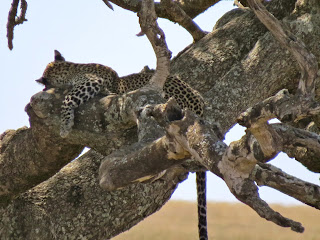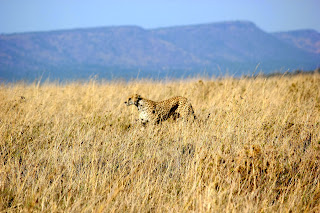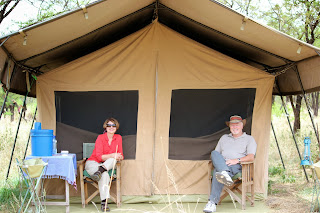Ombeni tells us a pride
of lions were in camp last night. I knew I heard a roar!
It’s a 5:15AM wake up
call made easier when hot water for each of us to wash in is poured
into two basins outside on our "porch". We have time for coffee, tea or hot chocolate
in the mess tent before we set off just as the sun is rising.
Ombeni wears a red and
blue plaid shawl wrapped around his body, (he’s cold); later in the morning it
goes from a shawl to an intricately tied neck wrap. He says it may be a
tablecloth soon.
We try to recall the group names for animals we've seen:
Troop of Baboons
Coalition of Cheetahs
Stand of Flamingoes
Tower of Giraffes
Bloat of Hippos
Leap of Leopards
Pride of Lions
Crash of Rhinos
Zeal or Dazzle of
Zebras
Business of Mongoose
Our game drive goes
from one ooooh to another aaaaah.
First is a bloat of
hippos. They’re lined up like submarines docked at a marina nose to shore, tails
out. A baby, one month old, with pink
skin stays close to Mama. They secrete a sweat-like substance for skin
protection, a natural sunscreen.
 |
| Baby Hippo |
A leopard is dreaming in a
tree, her tail dropped down and swinging languidly.
Down the road a bit is
her cub stretched out on his own branch. The flat-topped umbrella Acacia
trees grow branches at perfect angles and heft to support a lazing leopard.
If someone calls you a
leopard in Africa it means you are selfish. A solitary animal, they take their
prey up into a tree so they don’t have to share it.
More striped donkeys. Always a favorite.
More striped donkeys. Always a favorite.
Ostriches in a field
together, yet singular, their feathers like a fan dancer in a burlesque show,
fluffed out, dropped down, disguising what’s underneath.
A male cheetah steps up
on a rocky mound to survey the area and strikes a pose for us.
A topi with ringed
stripes stacked on his horns. Found only in the Sirengeti, they have a striking
branchlike pattern inside their ears and a definitive hump.
We stop for a snack of
grilled bread with peanut butter and honey.
The migration moves
like a clock from north to east to south to west.
In Tanzania, Arabs have leased a chunk of land that interferes with the
migration route. They shoot freely on this land. Private planes fly in and out
without passing customs. The lease was
signed for 99 years but was reduced to 25 after people objected. The current president, Jakaya Kikwete, says one thing but does another when it comes to protecting animals. Animals instinctively learn to avoid places where they have been attacked.
There are game reserves
in Tanzania where hunting is allowed for 6 months of the year form June to December.
Hunting is then closed for 6 months while the animals breed.
Only male animals can be killed. Hunters must pay to take the
horns, pay again for the meat, and again for the skin. The government owns the
game reserves. They charge $8000 for use of a land block. The permit is purchased by a commercial company and then
resold to hunters for $500,000. Hunters want to get their money’s worth so they
end up shooting anything and everything.
We are back in camp in
the heat of day for brunch and then some quiet time. Zebras pass, and giraffes
drift into view. Peaceful moments.
Our second game drive
starts at 3:30.
A Nubian vulture,
(largest vulture in the Serengeti), has a beak that works like shears and can
open a carcass with its scissor-like beak. Other birds wait around for him to show up. We
watch one vulture sitting at the very top of a tree, surveying. He then lifts
silently and gracefully, wings wide.
The Mbalageti River,
which flows into Lake Victoria, is a popular cooling off spot for elephant mud
baths. A big guy with a partially
amputated trunk is enjoying the river spa. Perhaps he wandered outside the
Serengeti and was caught in a trap. He’s a lucky survivor.
A hyena joins the pool/mud party soaking by himself under the bridge.
A hyena joins the pool/mud party soaking by himself under the bridge.
We cross the slatted wooden
bridge and watch the planks ripple under the weight of the turning tires.
We come upon an
overturned truck. The driver missed the corner and someone is injured and moaning audibly. The truck carried a
group of workers from a nearby camp. Our doctor contingent, (4+nurse) jumps from the Land Rover and is immediately
on the scene. It’s a broken clavicle. Ombeni’s red and blue plaid wrap becomes
a stretcher and the injured man is carried to another truck which will take him
to the closest clinic.
A serval cat runs
across the road, stops to look at us, and then disappears into the grass.
A tower of giraffes.
Their necks are long, but not always quite long enough.
They stretch, but
sometimes still need to use their long tongue, (16-18) to get hold of their
targeted leaves. At times they approach a shorter tree and bend over to eat
from the top down.
Large breeding herds of Cape Buffalo.
Large breeding herds of Cape Buffalo.
 |
| Helmeted Guinea Fowl |
 |
| African Spoonbill |
Mama lion is out
hunting. The nearby zebras see her and warn each other with a “whut, whut,
whut”.
We find her cubs
nestled into the top of a grassy hill, the top of their heads visible above the
grass line like Disney ears.
We spot two more
lionesses from the pride patrolling through the deep grass. Although the cubs
await; dinner plans don’t seem urgent to these ladies.
Sometimes you've gotta put the camera down
and just look and feel.
We’ve seen so much and
stopped so much we have to high tail it back to camp before dark. We go as fast
as can be gone on these crenelated washboards called roads. Our dust con-trail
plays out behind us.
Park rules say safari
vehicles can operate from 6AM to 6PM. They then have a one-hour window (until
7) to be back in camp or they will be fined. Anyone on the road after seven is
assumed to be a poacher.
In our tent we call,
“shower please” and the camp helpers bring a 5-gallon bucket for each of us.
They hoist it up with a pulley above the tent. In a gravity flow system the
water runs down through a hose and into a nozzle very much like my garden
watering wand. It’s refreshing, and eradicates the dust, but it’s a wee bit
disconcerting to have a stranger standing on the other side of the thin tent wall
waiting to see if more water is requested. All in all we are grateful.
 |
| Tent Interior |
At the bonfire Ombeni
tells two cultural tales.
In one Tanzanian tribe wives
equate being beaten with being loved. If a woman's husband beats her regularly it
means he loves her.
If the home is too
peaceful the wife may file for divorce.
In another tribe if a
woman is widowed she may “marry” a young girl – legally but not sexually. Then
she matches her young “wife” up with a man she pays to produce a child for her.
This practice contributes to the spread of AIDS.
Both of these traditions are now illegal in Tanzania, but long standing customs are
difficult to obliterate.













































Love the picture of the momma elephant and her baby!
ReplyDelete